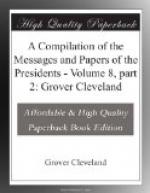Another feature of the proposed system is the selection by promotion of all officers of the Government above the lowest grade, except such as would fairly be regarded as exponents of the policy of the Executive and the principles of the dominant party.
To afford encouragement to faithful public servants by exciting in their minds the hope of promotion if they are found to merit it is much to be desired.
But would it be wise to adopt a rule so rigid as to permit no other mode of supplying the intermediate walks of the service?
There are many persons who fill subordinate positions with great credit, but lack those qualities which are requisite for higher posts of duty; and, besides, the modes of thought and action of one whose service in a governmental bureau has been long continued are often so cramped by routine procedure as almost to disqualify him from instituting changes required by the public interests. An infusion of new blood from time to time into the middle ranks of the service might be very beneficial in its results.
The subject under discussion is one of grave importance. The evils which are complained of can not be eradicated at once; the work must be gradual.
The present English system is a growth of years, and was not created by a single stroke of executive or legislative action.
Its beginnings are found in an order in council promulgated in 1855, and it was after patient and cautious scrutiny of its workings that fifteen years later it took its present shape.
Five years after the issuance of the order in council, and at a time when resort had been had to competitive examinations as an experiment much more extensively than has yet been the case in this country, a select committee of the House of Commons made a report to that House which, declaring its approval of the competitive plan, deprecated, nevertheless, any precipitancy in its general adoption as likely to endanger its ultimate success.
During this tentative period the results of the two methods of pass examination and competitive examination were closely watched and compared. It may be that before we confine ourselves upon this important question within the stringent bounds of statutory enactment we may profitably await the result of further inquiry and experiment.
The submission of a portion of the nominations to a central board of examiners selected solely for testing the qualifications of applicants may perhaps, without resort to the competitive test, put an end to the mischiefs which attend the present system of appointment, and it may be feasible to vest in such a board a wide discretion to ascertain the characteristics and attainments of candidates in those particulars which I have already referred to as being no less important than mere intellectual attainment.
If Congress should deem it advisable at the present session to establish competitive tests for admission to the service, no doubts such as have been suggested shall deter me from giving the measure my earnest support.




